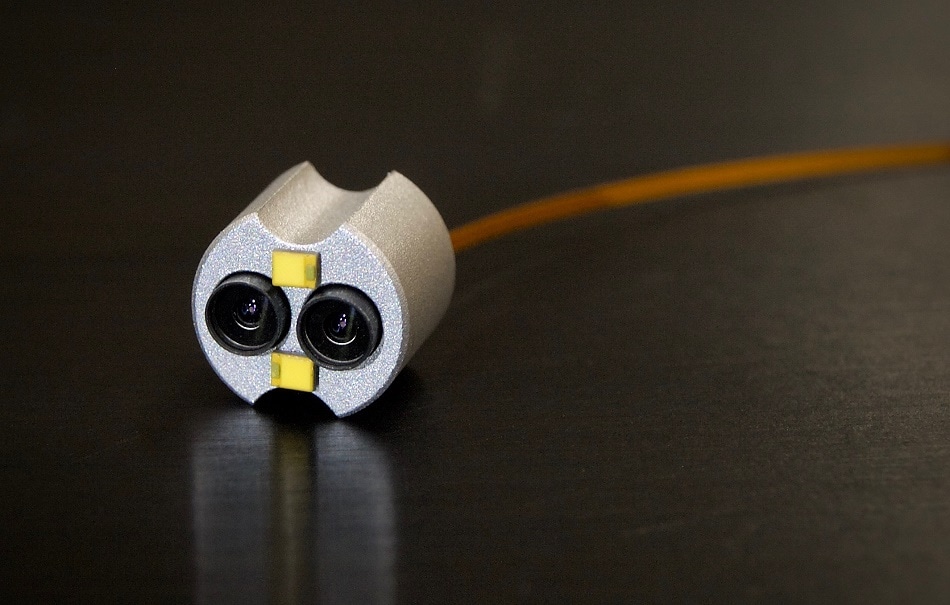OmniVision Technologies, Inc., a leading developer of advanced digital imaging solutions, and Lighthouse Imaging, a medical contract manufacturer and product development firm, today announced at the MD&M West tradeshow a platform that enables medical device manufacturers to seamlessly integrate stereoscopic 3D imaging into endoscopes. The platform incorporates two CMOS image sensors and an image signal processor (ISP) from OmniVision, plus a light control board for LED illumination and camera control unit from Lighthouse.

“Traditional endoscopy uses a single camera and does not provide depth information, thus increasing risks during endoscopic surgery,” said Tehzeeb Gunja, principal marketing manager at OmniVision. “This partnership with Lighthouse Imaging provides an end-to-end, turnkey solution for stereoscopic 3D imaging in applications such as laparoscopy, gastro-intestinal (GI) and general endoscopic surgery. OmniVision’s high-image-quality, high-resolution image sensors, combined with Lighthouse’s system-level integration expertise, allows us to overcome the complexity, cost and size constraints that have limited the wide adoption of 3D endoscopy.”
The platform includes two OmniVision OH02A image sensors with 1.4-micron pixel PureCel® technology in a 1/6-inch optical format. These sensors support alternate-row high dynamic range (HDR) for high-quality imaging of both bright and dark areas. They are also stereo-ready, with FrameSync technology that enables accurate synchronization of the sensors. On-chip pulse width modulation enables the sensors to drive the LEDs at the endoscope’s distal tip, while antireflective coating on the cover glass removes ghosting. These sensors come in compact chip-scale packages (CSPs) with two-lane MIPI output, and have low power consumption for low heat at the distal tip.
The 2-megapixel, 1080p resolution of the OH02A image sensor supports streaming video at 60 frames per second (fps), allowing an entire medical team to view high-quality images on a large television monitor. Additionally, the Lighthouse platform can be easily adapted to use OmniVision sensors with 720p or 4K/2K resolution, depending on whether cost or resolution take priority for the medical OEM.
The OVMed® ISP back-end processor provides stereo 3D vision. Its compact form factor fits inside the camera control unit (CCU) / video processor unit (VPU). Additionally, it supports an integrated design—including analog-to-digital converter, and dual-channel ISP and PC interface—which offers best-in-class image quality and feature set. An input interface is provided for dual OmniVision image sensors, and video is output via a dual-USB2.0 interface. The predefined GPIO pins connect to buttons to control the system. This processor has a fast response time (<100ms), LED control and low power consumption. A software development kit (SDK) and API are provided, and this software is compatible with the Windows® operating system.
“At Lighthouse Imaging, we are passionate about developing and manufacturing custom optical and digital imaging solutions for medical device companies,” said Robert Austring, CEO of Lighthouse Imaging. “With this partnership, leveraging OmniVision’s OH02A sensor and imaging expertise, we are now able to meet and exceed the high demands of our clients worldwide. OmniVision’s technologies allow us to immediately integrate quality image sensors into our systems and scale to create the next generation of products.”
Medical designers can integrate this platform directly into a design to reduce costs and pave an easy path to 510(k) clearance. This system is also completely customizable by switching out image sensors, lenses or illumination to achieve the desired optical performance, or to optimize system-level architecture for a specific application.
OmniVision’s OH02A sensor is RoHS and REACH compliant, and passes autoclave testing. The Lighthouse demonstration units are compliant with IEC and FDA regulations, and are ISO-13485 certified to reduce development risk.
This platform is available now. Please contact your OmniVision (www.ovt.com/contact-sales) or Lighthouse sales representative for more information. The new platform and other products will be on display at the OmniVision booth #1784 and the Lighthouse Imaging booth #817, at the MD&M West tradeshow in Anaheim, Calif., February 5-7.